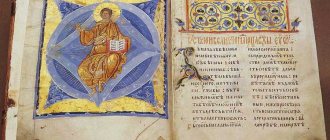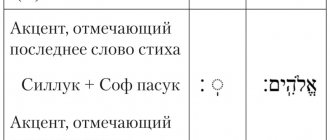Moscow Sretenskaya Theological Academy
Sretenskaya Academy 06.06.201656525
In the life of every person there is a period of cooling and despondency, when faith cools down, hands give up, and there seems to be no strength. Paradoxical as it may seem, often just one or two phrases from the works of the holy fathers of the Orthodox Church can help at such a moment the soul to perk up, light up, tune in, gather itself in order to again take up its cross and follow Christ. We bring to your attention the quotes that decorate the classrooms and corridors of Sretensky Theological Seminary: they edify, first of all, students and future shepherds, but will certainly be useful to a Christian of any age and education.
If you find that there is no love in you, but you want to have it, then do deeds of love, even if at first without love. The Lord will see your efforts and put love in your heart.
Venerable Ambrose of Optina
When you notice in yourself an involuntary feeling of hostility towards someone, try to overcome this sinful feeling by praying for him.
Venerable Ambrose of Optina
Just as bad water makes the best wines useless, so evil conversations corrupt people who are virtuous in life and character.
Venerable Anthony the Great
What is perfection in love? Love your enemies so much that you wish to make them brothers. For He loved so much Who, hanging on the cross, said: “Father, forgive them, for they do not know what they are doing” (Luke 23:34).
St. Augustine
Do not be mistaken about the knowledge of what will happen to you after death: what you sow here, you will reap there. After leaving here, no one can achieve success. Here is the work, there is the reward, here is the feat, there are the crowns.
Venerable Barsanuphius the Great
Do not give up prayer, for just as the body, deprived of food, weakens, so the soul, deprived of prayer food, approaches relaxation and mental death.
Saint Gennady of Constantinople
Know that if, being healthy, you live at someone else’s expense, then you are eating up the property of the poor and weak.
Saint Gregory the Theologian
When you begin to read or listen to the Holy Scriptures, pray to God like this: “Lord Jesus Christ, open the ears and eyes of my heart, so that I may hear Your words and understand them, and do Your will.” Always pray to God to enlighten your mind and reveal to you the power of His words. Many, relying on their own reason, were mistaken.
Venerable Ephraim the Syrian
When a person loses sympathy for the world, the world will lose its influence on the person.
Saint Ignatius (Brianchaninov)
We know and are convinced that falling away from the Church into schism, heresy, or sectarianism is complete destruction and spiritual death. For us there is no Christianity outside the Church. If Christ created the Church and the Church – His Body, then to be torn away from His Body means to die.
Hieromartyr Hilarion (Trinity)
You can be a free spirit among bonds, just as you can be a slave of passions on the throne.
Saint Innocent (Borisov)
Insects soon perish when they are seduced by the brilliance of a night lamp; we also soon perish when we are seduced by the beauty of vain blessings!
Saint John Chrysostom
A person does not live to be a hundred years old, but fusses to be a thousand.
Saint John Chrysostom
Run creatures if you want to have a Creator.
Saint John Chrysostom
God loves us more than a father, mother, friend, or anyone else can love, and even more than we can love ourselves.
Saint John Chrysostom
Obtain your daily food not with hidden money, but with your own labor.
Saint John Cassian
When they begin to praise us, let us hasten to remember our many iniquities; and we will see that we are truly unworthy of what they say or do in our honor.
Venerable John Climacus
When you want to instruct someone to goodness, first repose him physically and almost with a word of love.
For nothing brings a person to shame and forces him to abandon his vice and change for the better, like bodily goods and the respect that he sees from you. Then say a word or two to him with love, and do not become angry with him, and do not let him see a sign of enmity in you. For love does not know how to be angry and irritated. Venerable Isaac the Syrian
The Lord tolerates all kinds of human infirmities, but does not tolerate a person who always grumbles.
Venerable Isaac the Syrian
If you are not able to stop the mouth of someone slandering your friend, then at least beware of communicating with him.
Venerable Isaac the Syrian
If someone treats a brother with cunning, he will not escape heartbreak.
Reverend Abba Isaiah
Demons always lead us into sin with false dreams. Thus, with dreams of enrichment and self-interest, they set up the wicked Judas to betray the Lord and God.
Saint Hesychius of Jerusalem
God listens and fulfills a person's prayer when a person fulfills His commandments. “Listen to God in His commandments,” says Saint John Chrysostom, “so that He may hear you in your prayers.” A person who keeps God's commandments is always wise, patient and sincere in his prayers. The sacrament of prayer consists in keeping the commandments of God.
Venerable Justin (Popovich)
Editorial Board of Sretensky Seminary
SPIRITUAL WISDOM
In Christ “all the treasures of wisdom and knowledge” (Col. 2:3) By wisdom I mean the contemplation of what is. (8, 338).
Wisdom is the knowledge of things Divine... and human, also their causes (7, 168).
He who has heavenly concepts about God, who has studied the laws of creation from a high point of view and has been able, at least in part, to comprehend the grace of God’s Providence, is great... The voice of the Lord dwells in such people. For in the true sense, the great one despises everything corporeal, considering it to have no value in comparison with the invisible. No circumstance will offend him, no suffering will crush him. The misdeeds of worthless people will not cause him to be indignant. The uncleanness of the flesh will not humiliate him - he is inaccessible to humiliating passions that cannot touch him because of the height of his thoughts. Saint Basil the Great (4, 205).
Don't speak with anger. Let your words, like your silence, be filled with prudence and wisdom. The words of our wisest fathers were reasonable and wise, and their silence was similar. Venerable Anthony the Great (82, 25).
Whoever goes into the explanation of Scripture without first acquiring spiritual freedom is enslaved by the passion of curiosity and a strong passion for mental captivity. Venerable Abba Isaiah (82, 183–184).
Conversations with subtle researchers of God and reading subtle studies about God dry up tears and drive away tenderness from a person. He who reads the lives and sayings of the fathers enlightens his soul. Sayings of nameless elders (82, 380).
Christian wisdom is Christ, the Son of God. As Saint Paul says: He “has become to us wisdom from God” (1 Cor. 1:30). He reveals to us the secret of knowing the Heavenly Father. “No one has ever seen God; The only begotten Son, who is in the bosom of the Father, He has revealed” (John 1:18). And “no one knows the Father except the Son, and to whom the Son wants to reveal it” (Matthew 11:27). In Christ “all the treasures of wisdom and knowledge are hidden” (Col. 2:3), says the wise Paul. A simple Christian who is taught the dogmas of the holy faith is much wiser than Plato and Aristotle and other pagan sages. Which of them understood what a simple Christian knew by faith? “None of the authorities of this age knew this” (1 Cor. 2:8) (104, 1150).
The “signs” of spiritual wisdom are: 1) careful teaching in the word of God; 2) seeking guidance and advice from pious and reasonable people; 3) the ability to lovingly accept instructions, punishments, useful advice, reproofs; 4) reasoning about the wondrous Providence of God, about His truth and mercy; 5) frequent recollection of death and what follows, that is, of the Last Judgment of Christ, of a blessed and unhappy eternity; 6) contempt for the world; 7) most of all prayer, without which spiritual wisdom cannot exist (104, 1152–1153).
The “fruits” of spiritual wisdom are Christian virtues, that is, humility, patience, meekness, truth, chastity, mercy, etc. This is how Solomon teaches: “The fruits of it (wisdom) are virtues: it teaches chastity and prudence, justice and courage, more useful than which there is nothing for people in life” (Wisdom 8:7). And the Apostle James says: “The wisdom that comes from above is first pure, then peaceable, modest, obedient, full of mercy and good fruits, impartial and unfeigned” (James 3:17). She fears God and loves Him, turns away from the vanity of the world and cleaves to God alone. He consumes everything allowed: food, drink, clothing, etc. with fear for the sake of need, and not for the sake of luxury, and generously endures the misfortunes and misfortunes that happen. Shows herself to be obedient to God and people for God’s sake. It is not painful for her to do everything that pleases God, and to shy away from everything that is disgusting to Him. Pride, envy, anger, enmity, impurity, love of money and other spiritual ulcers have no place in it. She loves everyone indiscriminately, treats everyone with sincerity and simplicity. What he says in word, he has within himself, what he promises in word, he fulfills in deed, when there is no obstacle. She does not need notes in contracts: a word spoken and heard by another is a reliable record for her. She sees her brother suffering, and her heart sympathizes with him; helps those who need help; he sympathizes with every misfortune of his neighbor and rejoices in prosperity: he cries with those who weep and rejoices with those who rejoice; He accepts his friends in his arms and does not take away his love from his enemies. Therefore, she is peaceful, quiet, calm, joyful, cheerful, although she is also bothered by the evil spirit and his evil servants (104, 1154).
The goal to which this wisdom leads man is God and eternal bliss. For just as she herself comes from God, so she turns to God and leads those who love her to Him. (104, 1155).
True Christian wisdom is to overcome natural evil, that is, pride, arrogance, anger, malice, envy, hatred, impurity, voluptuousness, love of money, stinginess, intemperance, etc., and to follow the example of the holy life of Christ, that is, His humility, love , mercy, patience, meekness and His other wonderful divine virtues. His holy apostles exhort this and this is what Christ Himself teaches: “I am the light of the world; whoever follows Me will not walk in darkness, but will have the light of life” (John 8:12). From this it follows that those who do not follow the example of the life of Christ walk in darkness and are mistaken. (104, 1156–1157).
The means by which we come to spiritual wisdom are: 1) The Holy Word of God with the help of the Holy Spirit. For the Holy Scriptures, according to the words of the Apostle, “are able to make you wise... for salvation through faith in Christ Jesus” (2 Tim. 3:15). 2) Sincere prayer. This is what the apostle says: “If any of you lacks wisdom, let him ask God, who gives generously to all without reproach, and it will be given to him. But let him ask in faith, without any doubt” (James 1:5-6). Therefore, Solomon says: “Knowing that otherwise I could not master it (wisdom), as if God bestows it, and that it was already a matter of reason to know whose gift it was, I turned to the Lord and prayed to Him” (Wis. 8, 21). We learn the dogmas of spiritual wisdom not in the books of the sages of this age, but in the books of the prophets and apostles, and we learn it in the school of the Holy Spirit, who through His holy word makes wise the hearts of the faithful. Therefore, Christians, if we want to gain spiritual wisdom, need to diligently study day and night in the word of God and fervently pray to the Giver of wisdom - God. Saint Tikhon of Zadonsk (104, 1158).
Who are the “Holy Fathers”
In Orthodoxy, Holy Fathers are people who dedicated their lives to church activities and through whom the Holy Spirit revealed divine truths. The history of the life of the Holy Fathers and their theological creativity is studied by the science of pathology. And their doctrinal works and views belong to the theological discipline of patristics. The statements of the Holy Fathers are in the nature of rules. Their authority is considered unshakable and their opinion has become a guideline for the Church. The holiness of their lives and fidelity to church teaching is beyond doubt.
They formed the main doctrinal principles and theological texts of Christianity, and approved the list of sacred books included in the Bible. The Fathers also interpreted the Holy Scriptures, preventing the spread of many heretical teachings.
The Russian Orthodox Church conventionally distinguishes the patristic time period, which lasted from the first centuries after the Nativity of Christ and ended around 780. At this time, John of Damascus, the last of the especially revered Holy Fathers, died. Also, some Christian ascetics who lived in the Middle Ages are counted among the Holy Fathers. Such, for example, as Simeon the New Theologian (949 – 1022) and Gregory Palamas (1296 – 1359).
The most famous of the Holy Fathers are Saints Gregory the Theologian, John Chrysostom, Basil the Great
Are fathers always right?
It is worth remembering: the Holy Fathers, although they were endowed with an extraordinary mind and led an ascetic life, were only people and could make mistakes in some matters. This does not concern the fundamentals of Christian doctrine, but relates to the spiritual life of a person. In these matters, a person, having free will and reason, should not blindly rely on the opinions of the Holy Fathers. It is necessary to be able to analyze and listen to your soul, while relying on the texts of Holy Scripture and Tradition and the opinions of various holy fathers.
“And now let us recall that the dogmatic area is something about which we can say: “The fathers said.” But the area of everyday morality, behavior, attitude to different types of sin, to “ethos”, in short, the fathers could not define forever. It is not the same thing to live in a Christian or Muslim country. It is not at all the same thing to be in a temple once every three months, despite the fact that the temple is a block away, and to be in the temple just as often (rarely) despite the fact that it is 500 kilometers away. Adapting to life, understanding its nuances, separating the unimportant from the main – these are the eternal questions of man. And no one who lived in the 5th century can describe in detail my mode of behavior in the 21st century, no matter how holy it may be” (Archpriest Andrei Tkachev).








